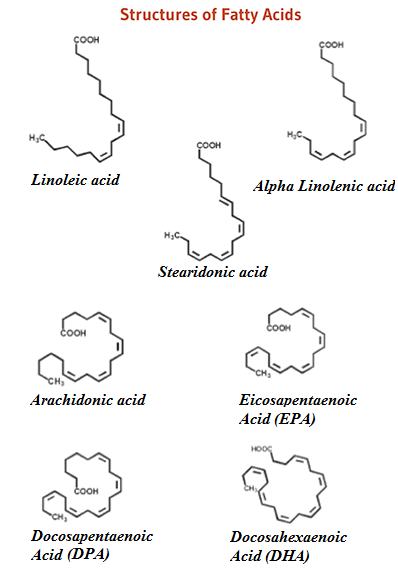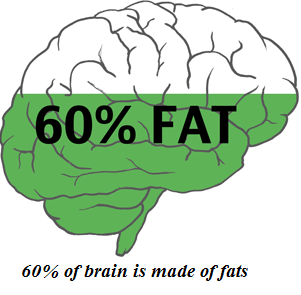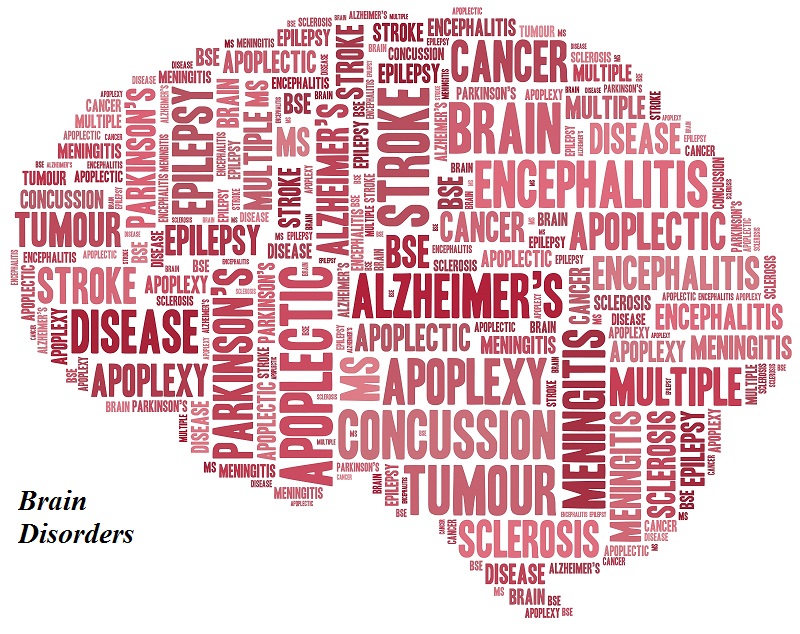Contents
- Essential fats and our brain
- Breastfeeding helps to develop higher intelligence in future
- Essential fats and Alzheimer’s disease
- Essential fats and depression
- Essential fats and bipolar disorder
- Essential fats and schizophrenia
- Essential fats and attention deficit/hyperactivity disorder -ADHD
- Essential fats and eating disorder (anorexia nervosa)
Essential fats and our brain
Human body needs essential fats for normal functioning and optimal health. Our body can’t produce essential fats, so we have to take them from dietary sources. Essential fats include two fatty acids, named: linoleic acid, which is omega-6 fatty acid and alpha-linolenic acid, which is omega-6 fatty acid. Under certain circumstances (for example in some diseases), some fatty acids like DHA (docosahexaenoic acid) and gama-linoleic acid may become essential.
About 60% of our brain contains fats. A low fat diet can result with cognitive malfunction and brain diseases. At the age of 6, the most parts of the brain are entirely developed, so essential fats play important rule in brain growth during the fetal and postnatal period.
Essential fats are substantial part of the brain structure, as messengers they are needed for production and appropriate function of neurotransmitters and for the regular function of the immune system.
Many studies have proven that appropriate diet or supplementation with essential fats has positive effects on the human brain health and function.
Breastfeeding helps to develop higher intelligence in future
Human milk contains large amounts of saturated fatty acids that are needed for the brain’s function and growth and there are many theories suggesting that prolonged breastfeeding can help in development of the brain. Fatty acids from breast milk are essential for production of myelin, the protective material on the neurons axons.
Brain tissue analysis shows higher levels of DHA in breastfed babies, hence many scientists call DHA a “Smart fat”. Breast milk also contains enzymes and hormones which are needed for neural development during the infancy.
One recent study from Brazil, published in The Lancet Global Health, shows the significant association between duration of breastfeeding and IQ. Study began in 1982 and was conducted on 5914 neonates and information about breastfeeding was collected in early childhood. After 30 years, in June 2012, 3493 of these participants were available to continue the study.
The study proved that the participants who were breastfed for one year or more, compared to the participants who were breastfed for less than 1 month, had higher intelligence quotient scores, higher level of education and higher incomes.
One meta-analysis of 14 observational studies, and two randomized trials from Belarus and UK, also showed that longer breastfeeding increases intelligence at a later age.
Essential fats and Alzheimer’s disease
Docosahexaenoic acid (DHA) is a long-chain omega-3 fatty acid, which is required for normal brain function. Fatty fish, like mackerel, salmon and tuna, contains high levels of DHA and low levels of DHA can be found in meat and eggs. DHA deficiency is associated with deficits in memory and learning.
Many studies showed that reduced dietary intake of DHA is an etiologic factor for Alzheimer’s disease and similar types of dementia. With aging, and especially among patients with Alzheimer disease, DHA levels in the brain tend to decrease, which suggests that a drop in DHA level could contribute to deterioration in memory and other cognitive functions.
Biological studies and animal models suggest that omega-3 fatty acids have a role in primary prevention of cognitive decline by improving blood flow, decreasing inflammation and/or reducing amyloid-β pathology.
Evidence from observational studies in humans favors consumption of long-chain omega-3 fatty acids to reduce cognitive decline with aging. The clinical trials conducted to date have shown no benefits of omega-3 fatty acids for secondary prevention or treatment of AD. Larger, ongoing, randomized trials should provide more-definitive answers regarding the use of long-chain omega-3 fatty acids for the prevention and/or treatment of AD.
Essential fats and depression
Low level of omega-3 fatty acids and high ratio of omega-6 to omega-3 fatty acids have been found in hospitalized patients with depression. One clinical study of patients with depression, show that patients who consume fatty fish 2–3 times per week for 5 years had a significant reduction of depressive episodes and symptoms.
Several studies also found that a combination of essential omega-3 fatty acids with prescription antidepressants was more successful than antidepressant therapy alone. Studies also show the benefits of omega-3 fatty acid intake, in prevention of postnatal depression, a clinical state which can affect mothers after childbirth.
Essential fats and bipolar disorder
There are studies that have shown that omega-3 fatty acids may be helpful for bipolar disorder when added to usual treatment. But it may be that omega-3 is more effective for depressive episodes than for manic episodes. These are currently small studies, but it is indicated that high doses are likely to be needed.
It is also unclear how much of the different types of omega-3 are required and whether omega-3 works best when added to mood stabilisers and antidepressants, or whether it is most effective when taken alone. One clinical study found that the patients who were treated with long-chain omega-3 fatty acids during 4 month, had less mood swings and relapse in comparison with those who received placebo.
Essential fats and schizophrenia
Many theories suggest that abnormalities of phospholipids metabolism can trigger schizophrenia in people with genetic predisposition. There are some evidences that show the improvement of symptoms in patients with schizophrenia when omega-3 fatty acids are given. The incidence of schizophrenia is lower in countries where the diet is rich with fatty acids.
Essential fats and attention deficit/hyperactivity disorder -ADHD
Researches have been found that children with attention deficit/hyperactivity disorder may have deficiency of essential fatty acids including EPA (Eicosapentaenoic acid) and DHA, and that supplementation with these acids can improve activities such as reading and spelling and behavior in children with this condition.
Essential fats and eating disorder (anorexia nervosa)
Clinical studies have found that people with eating disorder have lower concentrations of fatty acids (alpha-linolenic and gama-linolenic acids) in the body. Many health experts recommend fatty acid-rich foods such as fish and organ meats as a dietary treatment for anorexia nervosa.



